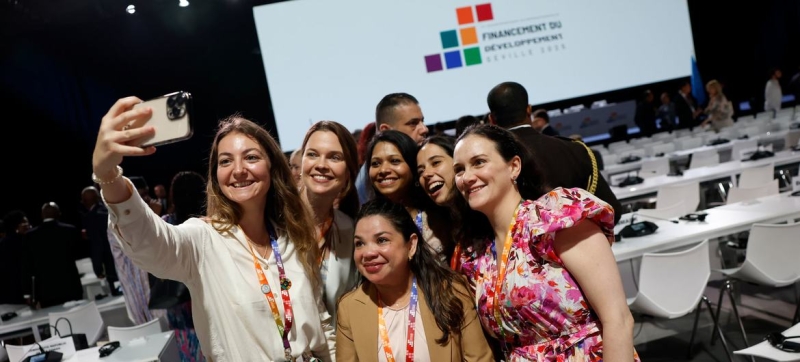- Polls in early next year: Prof Yunus tells Marco Rubio |
- Bangladesh’s Apparel Exports to US Hit $7.34bn in Decade |
- UN Chief Urges Urgent Aid Boost Amid Global Crises |
- Bamboo brings new life to Madaripur’s barren lands |
- Iran nuke program set back years with airstrikes: CIA says |
UN Unveils Action Platform after Seville Finance Pledges

Sevilla is hosting the 4th Financing for Development Conference. UN Photo/Mariscal
Following a wave of ambitious pledges in Seville, the United Nations has launched the Sevilla Platform for Action (SPA) — a global initiative aimed at transforming high-level promises into measurable progress on sustainable development.
The SPA, unveiled at the conclusion of the Fourth International Conference on Financing for Development (FFD4), comprises more than 130 specific actions designed to implement the Seville Agreement adopted earlier by over 150 countries and more than 50 world leaders. The platform seeks to support developing nations in mobilising resources, strengthening institutional capacity, addressing unsustainable debt, and reshaping the global financial architecture to better serve their investment needs.
Launching the platform, Spanish Prime Minister Pedro Sánchez underscored the urgency of the moment. He said the initiative represents a vital opportunity to rebuild trust in multilateral cooperation and to deliver tangible financing solutions to countries most in need. His remarks set the tone for a week marked by calls for concrete action and renewed global partnership.
UN Secretary-General António Guterres described the SPA as a “springboard toward a more just, inclusive and sustainable world.” Addressing the media in Seville, he acknowledged the absence of the United States from the final negotiations — a notable gap in the global consensus — but remained optimistic that meaningful progress could still be achieved by committed nations.
“To have the United States on board would be excellent, but it can be done in any case by those willing to act,” he said.
Guterres made clear that political will remains the essential ingredient for success. He urged world leaders to seize the momentum by adopting bold measures, such as reforming multilateral development banks and introducing global carbon taxation frameworks, to generate the resources required.
His message was unambiguous: the time to act is now. “It’s better to lead reform now than to suffer resistance later, when power dynamics inevitably shift,” he said. He stressed that the reforms proposed under the Seville framework — and those aligned with the upcoming Summit of the Future — are essential for both developing and developed nations alike.
Throughout the day, speakers reaffirmed their political commitment to implementing the Seville Agreement. The SPA, now serving as the operational arm of that commitment, has been structured to bring governments, private sector players, civil society organisations, and academic institutions into a unified effort. It invites them to submit bold, clearly defined initiatives to support the Sustainable Development Goals (SDGs), complete with timelines, funding strategies, and measurable outcomes. All accepted commitments will be tracked and reviewed in future UN forums, ensuring transparency and accountability.
An important dimension of the platform is the engagement of the private sector. At the opening of the International Business Forum — held in parallel with FFD4 — business leaders issued a powerful appeal to unlock more private capital for development. Guterres reminded participants that “development is everyone’s business,” stressing that the private sector has a critical role alongside governments and international institutions in achieving the SDGs.
A new communiqué from the conference’s Business Steering Committee, co-chaired by the International Chamber of Commerce and the Global Investors for Sustainable Development Alliance, outlined the business world’s commitment to supporting the SPA. It called for practical reforms to make private investment in development more viable and predictable, especially in lower-income countries.
Meanwhile, developing countries presented more than $1 billion worth of bankable projects across sectors such as renewable energy, agriculture, and digital infrastructure. These projects showcased the scale of investment opportunities already available and served as a call to action for both public and private capital.
Reflecting on the week’s developments, Li Junhua, the UN’s top economic official and Secretary-General of the conference, said the true test lies ahead.
“The focus now must be on action,” he declared, noting that Seville should be seen not as an endpoint but as a launchpad for a new era of delivery, reform, and solidarity.
With expectations high and the global spotlight fixed on what happens next, the Sevilla Platform for Action now stands as the world’s most coordinated attempt to bridge the massive development financing gap and set a new course toward a more equitable and resilient global economy.

